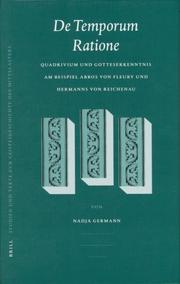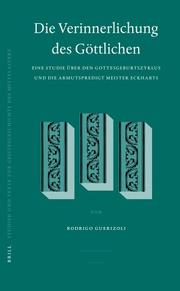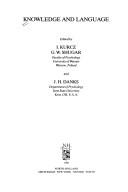| Listing 1 - 6 of 6 |
Sort by
|
Book

ISBN: 2802801570 2802804758 9782802801573 Year: 2019 Volume: 102 Publisher: Bruxelles : Presses de l’Université Saint-Louis,
Abstract | Keywords | Export | Availability | Bookmark
 Loading...
Loading...Choose an application
- Reference Manager
- EndNote
- RefWorks (Direct export to RefWorks)
S'interroger sur Dieu, interroger Dieu, être interrogé par Dieu sont autant de figures de la pensée qui semblent ne plus appartenir au champ des discours effectivement pertinents. Cela est-il vrai ? Quels sont les enjeux de la vérité qui se joue là ? Que Dieu soit, ou ne soit pas mis en questions ne concerne pas seulement le monde où ces questions sont posées ou, à l'inverse, effacées. Il ne s'agit pas seulement d'un diagnostic sur notre modernité. Tout de suite, cette réflexion se retourne en une question sur l'effacement comme la dynamique de la nomination de Dieu, au cœur même de l'intrigue de la révélation de ce qui ne s'appelle « Dieu » que par un abus de langage. Un abus de langage à la fois inévitable et riche des dynamiques humaines qui sont, après tout, les sens que ces noms disent à l'homme.
Doctrine of God (christianism) --- God --- Dieu --- Knowableness --- Cognoscibilité --- 231 --- God. De Deo uno et trino:--dogmatisch --- 231 God. De Deo uno et trino:--dogmatisch --- Cognoscibilité --- Philosophy --- Religion --- religion --- catholicisme --- judaïsme --- théologie --- évangile

ISSN: 01698028 ISBN: 9004153950 9789004153950 9786611400637 1281400637 9047411013 Year: 2006 Volume: 89 Publisher: Leiden; Boston : BRILL,
Abstract | Keywords | Export | Availability | Bookmark
 Loading...
Loading...Choose an application
- Reference Manager
- EndNote
- RefWorks (Direct export to RefWorks)
This study examines the scientific interests and rationality which find expression in the quadrivial sources of the 9th to 11th centuries, arguing on this basis for the existence of a 'discovery of nature' already prior to the 12th century. It focuses on the theme of 'time', exemplified by Abbo of Fleury's Computus, as well as Hermann of Reichenau's Epistola de quantitate mensis lunaris, Abbreviatio compoti and Prognostica. The systematic and historical background of the study is established through analysis of Alcuin's De vera philosophia, Bede's De temporum ratione and the computistic-astronomical anthologies which were the predominant genre during this period. The volume is complemented by fourteen illustrations and an appendix including Hermann's heretofore unedited texts, the Abbreviatio compoti and Prognostica.
Calendar --- Education, Medieval. --- God --- Calendrier --- Education médiévale --- Dieu --- History --- Knowableness --- History of doctrines --- Histoire --- Cognoscibilité --- Histoire des doctrines --- Abbo, --- Hermannus, --- God (Christianity) --- Knowableness. --- Criticism and interpretation. --- 2 ABBO FLORIACENSIS --- 115 --- Knowableness of God --- Knowledge of God (Knowableness of God) --- Education --- Medieval education --- Seven liberal arts --- Civilization, Medieval --- Learning and scholarship --- Computus --- Astronomy --- Chronology, Historical --- Chronology --- Godsdienst. Theologie--ABBO FLORIACENSIS --- Tijd. Duur. Eeuwigheid --- Knowledge (Knowableness) --- Contractus, Hermannus, --- Herman, --- Hermann, --- Abbon, --- 115 Tijd. Duur. Eeuwigheid --- 2 ABBO FLORIACENSIS Godsdienst. Theologie--ABBO FLORIACENSIS --- Education médiévale --- Cognoscibilité --- Education, Medieval --- Calendar - Europe - History - To 1500. --- God (Christianity) - Knowableness. --- Abbo, - of Fleury, Saint, - ca. 945-1004 - Criticism and interpretation. --- Hermannus, - Contractus, - 1013-1054 - Criticism and interpretation. --- Abbo, - of Fleury, Saint, - ca. 945-1004 --- Hermannus, - Contractus, - 1013-1054

ISSN: 01698028 ISBN: 9004150005 9789004150003 9047409027 143561481X Year: 2006 Volume: 88 Publisher: Leiden; Boston : BRILL,
Abstract | Keywords | Export | Availability | Bookmark
 Loading...
Loading...Choose an application
- Reference Manager
- EndNote
- RefWorks (Direct export to RefWorks)
This study analyses Meister Eckhart's doctrine on "the eternal birth of God in the soul" in order to draw a comprehensive picture of how it is rooted in medieval philosophical discussions about the relation between epistemology and ethics. Its source is a hitherto insufficiently examined group of sermons which form the only homiletic cycle in Eckhart's work, the so-called Gottesgeburtszyklus (Prr. 101-104). Through a systematic interpretation of the cycle the study shows in what way Eckhart's motif of the eternal birth as a progressive interiorisation of the divine nature inside the human soul is to be evaluated as an epistemologically justified effort. Finally it is shown how this process finds its radicalization in Eckhart's poverty sermon (Pr. 52).
Immanence of God --- Knowledge, Theory of (Religion) --- Sermons, German --- Sermons --- History and criticism. --- Eckhart, --- 248 ECKHART, Meister, O.P. (1260-ca.1328) --- Spiritualite. Ascese. Mystique. Theologie ascetique et mystique. Devotion--ECKHART, Meister, O.P. (1260-ca.1328) --- God --- Immanence de Dieu --- Dieu --- Sermons allemands --- Knowableness --- Histoire et critique --- Cognoscibilité --- Epistemology, Religious --- Religious epistemology --- Religious knowledge, Theory of --- Religion --- Theology, Doctrinal --- Divine immanence --- God, Immanence of --- Sermons&delete& --- History and criticism --- Philosophy --- Immanence --- Christianity --- Philosophy & Religion --- Immanence of God - Sermons - History and criticism. --- Knowledge, Theory of (Religion) - Sermons - History and criticism. --- Sermons, German - History and criticism. --- Eckhart, - Meister, - d. 1327. - Von der êwigen geburt. --- Eckhart, - Meister, - d. 1327. - Armutspredigt.

ISBN: 0444700668 9780080866932 008086693X 9780444700667 1282617826 9781282617827 9786612617829 6612617829 Year: 1986 Volume: 39 Publisher: Amsterdam North-Holland
Abstract | Keywords | Export | Availability | Bookmark
 Loading...
Loading...Choose an application
- Reference Manager
- EndNote
- RefWorks (Direct export to RefWorks)
How do people represent their knowledge about the world and use that knowledge for communication? This question is the central theme of this book. Among the aspects discussed in the first three sections are: the relationship between formal, logical descriptions of language, and psychological analyses of language use; how knowledge interacts with language use; and childrens' acquisition of language in different countries. In the last two sections, the topics discussed include the complex relationships between the development, transmission, and comprehension of intention and meaning
Cognitive psychology --- Lexicology. Semantics --- Psycholinguistics --- Language acquisition --- Cognition --- Psycholinguistique --- Langage --- Congresses --- Congrès --- Acquisition --- Psycholinguistique. --- Cognition. --- Psycholinguistics. --- Language acquisition. --- Psychology --- Acquisition of language --- Developmental linguistics --- Developmental psycholinguistics --- Language and languages --- Language development in children --- Psycholinguistics, Developmental --- Interpersonal communication in children --- Language, Psychology of --- Psychology of language --- Speech --- Linguistics --- Thought and thinking --- Connaissance --- Cinéma --- Philosophie de l'esprit --- Dieu --- Thérapie cognitive --- Théorie de la connaissance --- Psychologie cognitive --- Sciences cognitives --- Distracteurs (psychologie) --- Cognition distribuée --- Énaction --- Écriture --- Lecture --- Pensée --- Attention --- Savoir-faire --- Fonctions exécutives (neuropsychologie) --- Abstraction --- Catégorisation (psychologie) --- Cognition et culture --- Compréhension --- Conservation (psychologie) --- Dissonance cognitive --- Traitement de l'information chez l'homme --- Nombre, Idée de --- Perception --- Perception des structures --- Styles cognitifs --- Cartes cognitives --- Schèmes (psychologie) --- Métacognition --- Constructivisme (psychologie) --- Intuition --- Psychologie --- Apprentissage verbal --- Enfants --- Langue maternelle, Acquisition de la --- (linguistique) --- Langues --- Parole --- Psychologie du langage --- Biolinguistique --- Neurolinguistique --- Psychanalyse et langage --- Attitudes linguistiques --- Compétence de communication (linguistique) --- Compétence et performance (linguistique) --- Conscience linguistique --- Contrôle (linguistique) --- Créativité (linguistique) --- Différenciateur sémantique --- Discours intérieur --- Langage et émotions --- Linguistique cognitive --- Perception de la parole --- Psychophonétique --- Saillance linguistique --- Son --- Tabous linguistiques --- Tests linguistiques --- Troubles du langage --- Linguistique --- Acquisition. --- Psychological aspects --- Aspect cognitif --- Cognoscibilité --- Tests --- Langage -- Acquisition --- Apprentissage --- Aspect psychologique --- Différences entre sexes --- Aspect symbolique --- Acquisition linguistique --- Innéisme (linguistique) --- Reconnaissance des mots --- Psychologie de l'apprentissage --- Language Development --- Psycholinguistic --- Language Acquisition --- Acquisition, Language --- Development, Language --- Cognitive Function --- Cognitions --- Cognitive Functions --- Function, Cognitive --- Functions, Cognitive --- Submorphologie --- Sériation (psychologie) --- Prospection épisodique --- Traitement de l'information (psychologie) --- Amorçage syntaxique --- Acquisition du langage --- Psychologie de la lecture
Book
ISBN: 9781575064338 1575064332 9781575064345 1575064340 Year: 2016 Publisher: Winona Lake, Indiana : Eisenbrauns,
Abstract | Keywords | Export | Availability | Bookmark
 Loading...
Loading...Choose an application
- Reference Manager
- EndNote
- RefWorks (Direct export to RefWorks)
Theologians and Old Testament scholars have been at odds with respect to the best interpretation of the imago Dei. Theologians have preferred substantialistic (e.g., image as soul or mind) or relational interpretations (e.g., image as relational personhood) and Old Testament scholars have preferred functional interpretations (e.g., image as kingly dominion). The disagreements revolve around a number of exegetical questions. How do we best read Genesis 1 in its literary, historical, and cultural contexts? How should it be read theologically? How should we read Genesis 1 as a canonical text? This book charts a path through these disagreements by offering a dogmatically coherent and exegetically sound canonical interpretation of the image of God. Peterson argues that the fundamental claim of Genesis 1:26–28 is that humanity is created to image God actively in the world. “Made in the image of God” is an identity claim. As such, it tells us about humanity’s relationship with God and the rest of creation, what humanity does in the world, and what humanity is to become. Understanding the imago Dei as human identity has the further advantage of illuminating humanity’s ontology.Canonically, knowledge of the contours and purpose of human existence develops alongside God’s self-revelation. Tracing this development, Peterson demonstrates the coherence of the OT and NT texts that refer to the image of God. In the NT, Jesus Christ is understood as the realization of God’s image in the world and therefore the fulfillment of the description of humanity’s identity in Genesis 1. In addition to its specific focus on resolving interdisciplinary tensions for Christian interpretation of the imago Dei, the argument of the book has important implications for ethics, the doctrine of sin, and the doctrine of revelation.
Image of God --- Identity (Psychology) --- Identification (Religion) --- Theological anthropology --- 22.08*02 --- Identity (Religion) --- Religious identity --- Psychology, Religious --- Man (Christian theology) --- Personal identity --- Personality --- Self --- Ego (Psychology) --- Individuality --- God --- God, Image of --- Image (Theology) --- 22.08*02 Bijbelse theologie: mens; antropologie --- Bijbelse theologie: mens; antropologie --- Religious aspects&delete& --- Christianity --- Image --- Image of God. --- Religious aspects --- Christianity. --- Homme (theologie) --- Identification (religion) --- Identite (psychologie) --- Image de Dieu. --- Aspect religieux --- Christianisme. --- Dieu --- Homme, image de Dieu (théologie) --- Image divine --- Imago Dei --- Imitation de Dieu --- Divinisation --- Anthropologie théologique --- Identité personnelle --- Identité --- Comparaison sociale --- Conscience de soi --- Déracinement --- Appartenance (psychologie sociale) --- Appartenance religieuse --- Passing (identité) --- Identité numérique --- Identité collective --- Identité professionnelle --- Identité sexuelle --- Personnalité --- Affiliation religieuse --- Appartenance à une religion --- Appartenances religieuses --- Identification à une religion --- Identification religieuse --- Identité (religion) --- Identité religieuse --- Religion --- Religions --- (psychologie) --- Contribution à l'anthropologie théologique --- Homme (théologie) --- Anthropologie sacrée --- Théologie de l'homme --- Pensée religieuse --- Âme (religion) --- Chair (théologie) --- Désir de Dieu --- Épreuve (religion) --- Homme (théologie chrétienne) --- Homme (théologie juive) --- Image de Dieu --- Théologie --- Cognoscibilité --- théologie --- droit --- psychologie --- Appartenance --- Christianisme
Book
ISBN: 1575064324 9781575064321 9781575064314 1575064316 Year: 2016 Publisher: Winona Lake, Indiana : Eisenbrauns,
Abstract | Keywords | Export | Availability | Bookmark
 Loading...
Loading...Choose an application
- Reference Manager
- EndNote
- RefWorks (Direct export to RefWorks)
What do rituals have to do with knowledge? Knowledge by Ritual examines the epistemological role of rites in Christian Scripture. By putting biblical rituals in conversation with philosophical and scientific views of knowledge, Johnson argues that knowing is a skilled adeptness in both the biblical literature and scientific enterprise. If rituals are a way of thinking in community akin to scientific communities, then the biblical emphasis on rites that lead to knowledge cannot be ignored. Practicing a rite to know occurs frequently in the Hebrew Bible. YHWH answers Abram's skepticism-"How shall I know that I will possess the land?"-with a ritual intended to make him know (Gen 15:7-21). The recurring rites of Sabbath (Exod 31:13) and dwelling in a Sukkah (Lev 23:43) direct Israel toward discernment of an event's enduring significance. Likewise, building stone memorials aims at the knowledge of generations to come (Josh 4:6).Though the New Testament appropriates the Torah rites through strategic reemployment, the primary questions of sacramental theology have often presumed that rites are symbolically encoded. Hence, understanding sacraments has sometimes been reduced to decoding the symbols of the rite. Knowledge by Ritual argues that the rites of Israel, as portrayed in the biblical texts, disposed Israelites to recognize something they could not have seen apart from their participation. By examining the epistemological function of rituals, Johnson's monograph gives readers a new set of questions to explore both the sacraments of Israel and contemporary sacramental theology.
Sacraments. --- Rites and ceremonies. --- Knowledge, Theory of (Religion) --- Epistemology, Religious --- Religious epistemology --- Religious knowledge, Theory of --- Religion --- Theology, Doctrinal --- Ceremonies --- Cult --- Cultus --- Ecclesiastical rites and ceremonies --- Religious ceremonies --- Religious rites --- Rites of passage --- Traditions --- Ritualism --- Manners and customs --- Mysteries, Religious --- Ritual --- Church --- Grace (Theology) --- Rites and ceremonies --- Philosophy --- Sacraments --- Théorie de la connaissance (christianisme) --- Théorie de la connaissance (religion) --- Rites et cérémonies. --- Sacrements. --- Efficacité des sacrements --- Théologie des sacrements --- Théologie sacramentaire --- Vie sacramentelle --- Pastorale liturgique et sacramentelle --- Sacramentaux --- Sacrements --- Sacrements et unité chrétienne --- Vie chrétienne --- Baptême --- Confirmation (sacrement) --- Eucharistie --- Mariage (sacrement) --- Onction des malades --- Ordre (sacrement) --- Pénitence --- Rites et cérémonies --- Théologie dogmatique --- Cérémonial --- Cérémonial religieux --- Cérémonies --- Cérémonies et rites --- Cérémonies et rituels --- Cérémonies religieuses --- Religions --- Rites --- Rites et cérémonies (ethnologie) --- Rites et cérémonies (religion) --- Rites et cérémonies religieux --- Rites religieux --- Ritualisme --- Ritualité --- Rituel religieux --- Rituels --- Rituels et cérémonies --- Rituels religieux --- (féodalité) --- (anthropologie) --- (communion solennelle) --- Contribution à la théorie de la connaissance religieuse --- Connaissance religieuse, Théorie de la --- Théorie de la connaissance religieuse --- Théorie de la connaissance --- Agnosticisme --- Analogie (religion) --- Dieu --- Foi et raison --- Théorie de la connaissance (bouddhisme) --- Théorie de la connaissance (christianisme) --- Théorie de la connaissance (hindouisme) --- Théorie de la connaissance (islam) --- Théorie de la connaissance (jaïnisme) --- Transmission spirituelle --- Christianisme --- Philosophie chrétienne --- Théorie de la connaissance (religion) --- droit canonique --- Liturgie --- Aspect religieux --- Dédicace --- Cérémonies et fêtes --- Cognoscibilité --- Coutumes et pratiques --- Culte --- Danse --- Lieux sacrés --- Vêtements religieux --- Abattage rituel --- Autels --- Écoles --- Églises --- Entreprises --- Exorcisme --- Fêtes religieuses --- Franc-maçonnerie --- Hindouisme --- Hommage (féodalité) --- Iconophagie --- Imposition des mains --- Bals de pureté --- Inaugurations --- Incantations --- Indiens d'Amérique --- Jeux olympiques --- Judaïsme --- Marche sur le feu --- Monastères --- Objets rituels --- Ordination --- Bouddhisme --- Paraliturgies --- Possession (anthropologie) --- Processions --- Profession de foi (communion solennelle) --- Profession religieuse --- Protocole --- Pureté rituelle --- Repas rituels --- Rites d'initiation --- Rites de fondation --- Cannibalisme --- Rites de passage --- Rites et cérémonies agraires --- Rites et cérémonies de la naissance --- Rites et cérémonies du mariage --- Rites et cérémonies funéraires --- Rites et cérémonies interreligieux --- Rites et cérémonies militaires --- Rites et cérémonies politiques --- Rites et cérémonies préhistoriques --- Cérémonie du thé --- Sacrifice --- Saut du Gol --- Serments --- Transe --- Translation de reliques --- Védisme --- Violence rituelle --- Commémorations --- Consécration --- Défilés --- Don et contre-don --- Moeurs et coutumes
| Listing 1 - 6 of 6 |
Sort by
|

 Search
Search Feedback
Feedback About
About Help
Help News
News